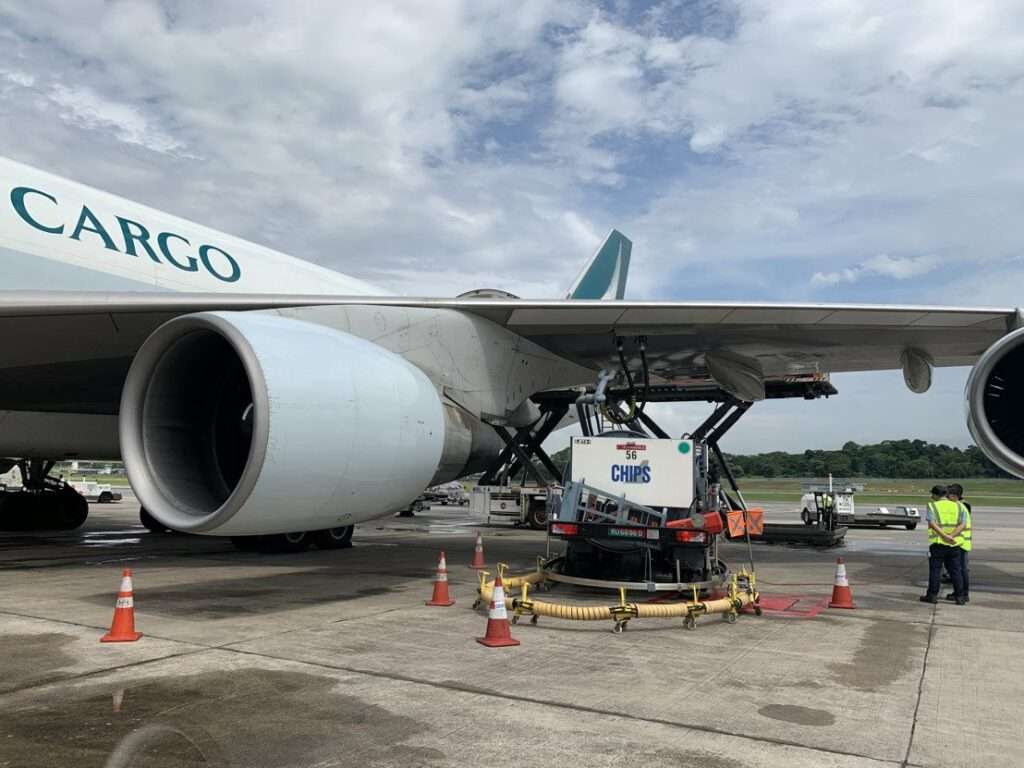In its commitment to combat climate change and reduce carbon emissions, Cathay Pacific has made significant progress towards achieving its goal of using Sustainable Aviation Fuel (SAF) for 10% of its total fuel consumption by 2030.
Recently, Cathay Pacific achieved a further milestone by introducing SAF on its commercial flights outside of its Hong Kong hub.
Cargo operations on blended SAF
ExxonMobil Asia Pacific Pte Ltd blended and supplied the SAF used by Cathay Pacific for this key initiative. The refuelling took place at Singapore Changi Airport, where SAF was uplifted onto four Cathay Pacific cargo flights.
Specifically, flights CX2076 to Hong Kong on June 7, 14, and 28, and CX2074 to Penang on June 30 were powered by this sustainable fuel.
This follows a previous operation by Cathay Pacific, where blended SAF was successfully uplifted at Hong Kong International Airport for selected flights last year.
Additionally, Cathay Pacific has been utilizing blended SAF during the delivery flights of its new Airbus A350 aircraft from Europe over the past six years.
The significance of this milestone was lauded by Ronald Lam, the Group Chief Executive Officer of Cathay Pacific, who expressed his excitement and the company’s commitment to achieving net-zero carbon emissions by 2050.
[monsterinsights_popular_posts_inline]
Lam emphasized that as an international airline, Cathay Pacific plays a pivotal role in leading the aviation industry’s decarbonization efforts.
Lam further explained Cathay Pacific’s belief that SAF will serve as the primary lever for the aviation industry to attain net-zero carbon emissions.
Raising awareness across Asia-Pacific region
By expanding the use of blended SAF on selected commercial flights at Changi Airport, as well as their home hub in Hong Kong, Cathay Pacific aims to raise SAF awareness across the Asia Pacific region.
This concerted effort also sends a strong signal to the supply chain that there is a growing demand for SAF among airlines.
The SAF uplifted by Cathay Pacific is derived from 100% used cooking oil and meets the rigorous International Sustainability and Carbon Certification (ISCC) EU standards.
On a lifecycle basis, this sustainable fuel can reduce greenhouse gas (GHG) emissions by nearly 90% compared to conventional jet fuel.
This reduction in emissions provides a significant contribution to lower the carbon footprint of air travel and air cargo.
ExxonMobil Asia Pacific Pte Ltd expressed their satisfaction in collaborating with Cathay Pacific to facilitate the successful deliveries of certified SAF in Singapore.
Ong Shwu Hoon, the Vice President of Asia Pacific Fuels at ExxonMobil, highlighted the company’s unwavering focus on expanding their lower GHG emission fuels business to support the aviation industry’s decarbonization goals. ExxonMobil leverages its operational and logistical capabilities to drive this endeavor forward.
With a firm commitment to increasing the adoption of SAF, the airline introduced the Cathay Pacific Corporate SAF Programme in 2022. It was the first major program of its kind in Asia, with eight corporate entities joining as launch customers.
The program empowers corporate customers to reduce their carbon footprint stemming from business travel or airfreight by actively contributing to the use of SAF.
The Hong Kong carrier aims to onboard more corporate customers to the program in 2023, further accelerating the transition to sustainable aviation practices.









